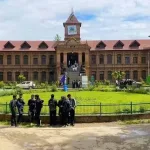Jeremy Bentham has rightly said-“Witnesses are the eyes and ears of Justice”. For the legal system to work smoothly, it is imperative that these eyes and ears are kept safe. The recent killing of Umesh pal, the key witness in the 2005 murder of the then newly-elected Bahujan Samaj Party (BSP) MLA Raju Pal, in Prayagraj district has come as a huge shock for other eye-witnesses in this sensational murder case. The fears of all these witnesses have awakened new, especially in the light of the fact that they had never stopped looking over their shoulders in fear of what might happen to them! The murder also raised a huge uproar in the Uttar Pradesh Assembly.
As the Samajwadi Party (SP) raised the issue, Chief Minister Yogi Adityanath accused the SP regime of promoting criminals and vowed to destroy “mafias and criminals such as former MP Atiq Ahmed”, who is the prime accused in the Raju Pal case. Umesh Pal, the key witness was shot dead near his house in Dhoomanganj, Prayagraj, in circumstances similar to Raju Pal’s killing in the area in Prayagraj way back on January 25, 2005. Prayagraj Police Commissioner Ramit Sharma told reporters that Umesh Pal was attacked with crude bombs and shot outside his house this evening. Two of his gunners too were injured in the attack. A severely injured Umesh Pal was rushed to Swaroop Rani Nehru Hospital where he succumbed during treatment, police said.
A day after the murder, the police registered an FIR naming Ahmed, who is currently in jail, his wife Sahista Parveen, his two sons, and younger brother Khalid Azim alias Ashraf, among others. A total of 14 suspects, including Atiq Ahmed’s sons, have been held for questioning. Atiq Ahmed, his brother, and ex-MLA Ashraf are prime accused in the Raju Pal murder case and all the accused are presently lodged in jail.
A woman eyewitness in the case, who lives in Prayagraj district, has reportedly said that she had been regularly keeping tabs on the case and that since Umesh Pal’s murder no one in her family has stepped out of their house. The woman also reportedly said that-“I am an eyewitness in Raju Pal’s murder case. After Umesh Pal’s murder, we all are scared because the assailants were able to shoot him despite the fact that he had two police gunners for security. One of the gunners also died in the attack.” Going down the memory lane, she also added-“In 2005, I was sitting next to Raju Pal in a car when a group of assailants attacked him. Two bullets hit my right shoulder and I was hospitalised for a long time. After Raju Pal’s murder, I was given a police gunner for a brief period but the security was withdrawn later. A few years later, I was again given security cover, but that too was withdrawn,”
Fearing for her life, the woman said that she had been constrained to make private arrangements for her as well as her family’s security as – a “group of assailants had allegedly threatened her family by opening fire outside their house”. The family also reportedly alleged that the attack was in retaliation to her statement that was recorded before the CBI. An FIR was lodged at a local police station after the woman’s family had filed a complaint. Her husband who is a farmer reportedly said, “We are being pressured. Fearing our safety, we sold our first house and shifted to a new one. Umesh Pal’s murder has shaken us.” “We are not in touch with other witnesses of the (Raju Pal) murder case but I had met Umesh Pal several times in court,” the woman added. In another interview, Raju Pal’s wife MLA Pooja Pal was reportedly heard saying that- “The woman was among the eyewitnesses who were injured in the attack on my husband. She was my husband’s friend.”
Considering the state of the witnesses and their protection, it is imperative that due protection is given to them as their testimony goes a long way in punishing the culprits responsible for these sensational murder cases that happen in broad daylight and wreck havoc in the minds of the common man. Even though the Witness protection in India is not a heavily discussed matter as compared to other issues like rape, domestic violence, etc. it’s importance in the legal system cannot be over emphasised. Both the parties to the case are well aware that a single eye-witness has the power to tilt the verdict in their favor, consequently, many times witnesses are either emotionally blackmailed or bribed to stay quiet and change their stand in a case. Some are even threatened in order to dissuade them from giving their testimony.
Legally speaking, a witness is a person who sees the crime happen and who has the ability to express it when asked by the court. Under Section 118 of the Indian Evidence Act 1872, the term witness is defined as a person who is competent enough to understand the questions asked by the court. Thus, according to this section, any person can be a witness unless they are unable to understand and answer the questions that are asked to them.
After a spate of crimes that involve killing of key witnesses, their protection in certain cases that have been going on for many years has become an issue of grave concern in India. It is rarely seen that a witness has changed his/her stand by his/her own free will during a trial, at the same time it has also been observed that due to certain pressures that include the threat to the life of the witness itself, one of the main reasons for them changing their stance can be the lack of proper protection given by the State. Such witnesses are known as hostile witnesses. The 4th National Police Commission Report 1980, states that most witnesses in India are turning hostile because of pressure and coercion by the accused and that a regulation on the manipulation of witnesses is necessary. The state of witnesses in India is bad specially in the light of the fact that there is a lot of stress witnesses have to deal with-first witnessing the entire crime scene and then staying in fear against a possible threat to their lives.
The Right to Fair Trial provided to all citizens by the Constitution of India under article 21 is an important feature of the Indian Democracy. In light of the same and to ensure adequate protection to a witness, The Witness Protection Scheme was set up in the year 2018, which is the first legal enactment set up by the Indian Government. The need for such an Act was long overdue. The objective of the scheme is simple- to Protect and safeguard the interests of the witnesses in India. The Scheme further enables the witness to get a police escort to the courtroom. The Act prescribes dividing the witnesses into three categories:
- Class A: When the witness and his/her family members get threats to their lives during the proceedings.
- Class B: When the safety, reputation, and property of the witness and his/her family members during the investigation is threatened.
- Class C: When the threat only extends to harassment of the witness and his/her family members during the proceedings.
The Scheme also goes a step ahead and provides for a Witness Protection Fund, which is created for the expenses incurred during a witness protection order. Witness protection Order is the detailed list of protective measures to be passed by a competent authority. Further, the Scheme ensures full identity protection of the witness and his/her family members during the investigation. Some of the other protective measures mentioned in this Scheme include:-
- Installation of security cameras at the witness’s house.
- Regular patrolling, and recce of the witness’s house.
- Monitoring the witness’s call records, emails, messages, etc.
- Relocation of the witness based on the Threat analysis report.
- Emergency contact numbers are provided to the witness.
The witness protection program in India has definitely come a long way since the 14th Law Commission Report in 1958, which talked about the witness protection in India for the first time. Thereafter, various other enactments including, the Protection of Children from Sexual Offences Act 2012, the Scheduled Caste and Tribes (Prevention of Atrocities) Act 1989, the National Investigation Agency Act 2008, etc. have mentioned the need to safeguard the rights of witnesses and give them adequate protection. From the crime scene to the courtroom, a witness has to experience everything. To add further misery, they are exposed to life threats, coercion, harassment, etc. by the accused. The recent cases of Asha Ram Bapu, VYAPAM and now Umesh Pal are the best examples wherein not only the prime witnesses, but also various journalists and other individuals who were associated with the case were killed.
The efficacy of the witness protection program in India as compared to the other developed countries like The United States can be said to be extremely poor. It is not that the laws are not present. Some of them are in place, but the difficulty remains that they have not developed at the same pace as the crime itself. The United States has the laws on “Witness Protection” which most of the countries do not have. From the prevention of ‘witness intimidation,’ to maintaining the ‘anonymity’ are some of the most important aspects of “Witness Protection” issues that the “Witness Protection Programs” in the United States deliberate upon and that too is done comprehensively and extensively. It will therefore be in the interest of India to fall back upon the United States for starting the Witness Protection Programs as the situation of protection of witnesses here is bleak. Due to their lack of witness protection in India, many witnesses do not favor the victim or appear in court.
The Indian Witness Protection Scheme 2018, and also the setting up of separate vulnerable witness deposition centres even though can be said to be important and effective steps taken by the administration, we still have a long way to go before India can be said to have an effective witness protection program. Unanimous and separate legal provisions for safeguarding the rights of vulnerable witnesses including strict punishments for those who manipulate the witness is the need of the hour as it is the witness who plays a crucial role in discovery of truth and consequently administration of justice and is entitled to get protection from the accused person in order to testify freely in the court of law. Without assurance of safety no person will be ready to come forward and share the information related to the crime.
(The author is an Advocate on Record practising in the Supreme Court of India, Delhi High Court and all District Courts and Tribunals in Delhi. She has done her Doctorate in Criminal Law and is the Legal Member in the Internal Complaints Committee of various private as well as Government Organizations. She can be reached at: [email protected])





